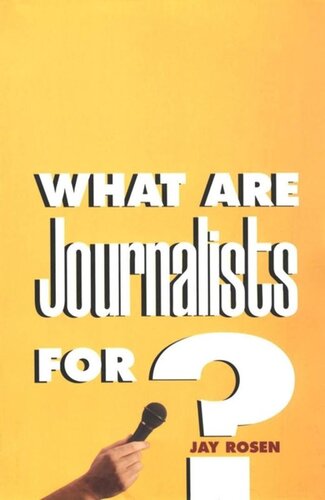

Most ebook files are in PDF format, so you can easily read them using various software such as Foxit Reader or directly on the Google Chrome browser.
Some ebook files are released by publishers in other formats such as .awz, .mobi, .epub, .fb2, etc. You may need to install specific software to read these formats on mobile/PC, such as Calibre.
Please read the tutorial at this link: https://ebookbell.com/faq
We offer FREE conversion to the popular formats you request; however, this may take some time. Therefore, right after payment, please email us, and we will try to provide the service as quickly as possible.
For some exceptional file formats or broken links (if any), please refrain from opening any disputes. Instead, email us first, and we will try to assist within a maximum of 6 hours.
EbookBell Team

0.0
0 reviewsAmerican journalists in the 1990s confronted disturbing trends—an erosion of trust in the news media, weakening demand for serious news, flagging interest in politics and civic affairs, and a discouraging public climate that seemed to be getting worse. In response, some news professionals sought to breach the growing gap between press and public with an experimental approach—public journalism. This book is an account of the movement for public journalism, or civic journalism, told by Jay Rosen, one of its leading developers and defenders. Rosen recalls the events that led to the movement’s founding and gives a range of examples of how public journalism is practiced in American newsrooms. He traces the intellectual roots of the movement and shows how journalism can be made vital again by rethinking exactly what journalists are for.
Those who have supported the cause of public journalism have focused on first principles: democracy as something we do, citizens as the ones who do it, politics as public problem-solving, and deliberation as a means to that end. Rosen tells what happened as the movement gained momentum in newsrooms around the country and in the professional culture of the press. He reviews the flood of criticism and commentary aimed at public journalism and responds to those who express alarm at the experiment. Examining the mark that the movement has made on the field, Rosen upholds public journalism not only as a way for journalists to find a renewed sense of civic purpose for their craft, but also as a way to improve civic life and strengthen democracy.